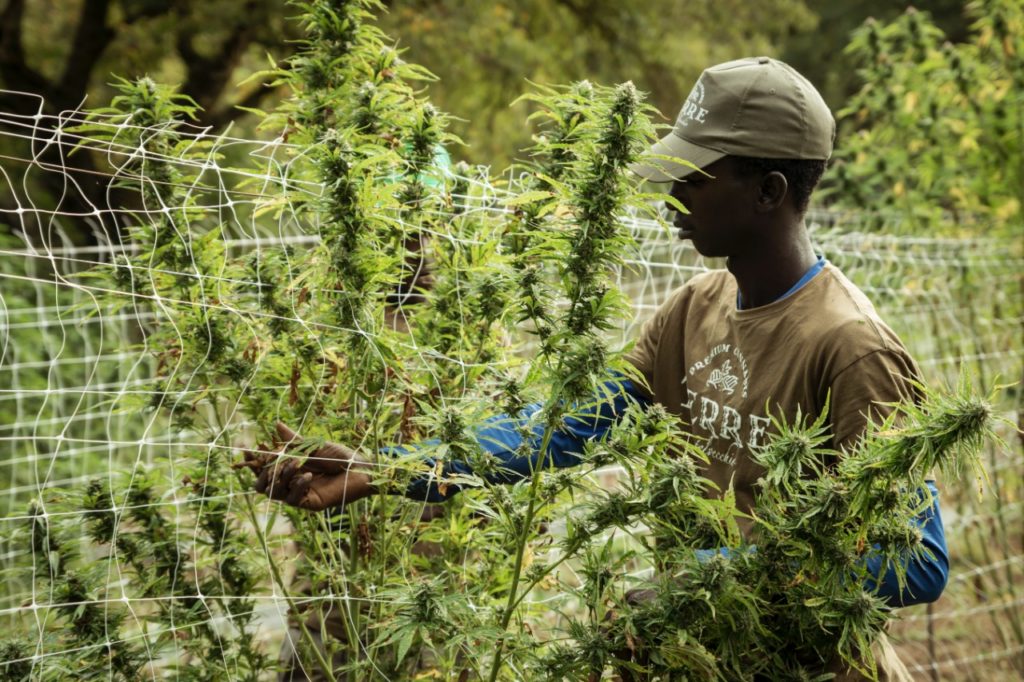NAIROBI, Kenya, Dec 4- Though illegal, a section of Kenyans often call for its legalization and openly so and mostly on social media platforms.
When the World Health Organization announced it had moved cannabis from the strictest schedule, Schedule 4, of the 1961 Single Convention of Narcotic Drugs, the move elicited excitement among some people.
All this time, the National Authority for the Campaign against Alcohol and Drug Abuse (NACADA) was watching and has sought to make a few things clear; weed as cannabis sativa is commonly known in the streets is still illegal.
In a statement, NACADA Chief Executive Officer Victor Okioma said rescheduling of the cannabis plant and resin only “eases Member states access to Cannabis for medical and scientific purposes, it does not in any way legalize the use of cannabis for recreational purposes.”
Before the review, he said Kenya had “advocated for the retention of cannabis plant and cannabis resin in both Schedule 1 and 4 of the 1961 Convention.”
“The decision was based on the argument that having Cannabis plant and cannabis resin in both Schedule 1 and 4 of the 1961 Convention did not limit states’ access to the substance for medical and scientific purposes.”
Also Read:
Two arrested as police seize bhang in Sololo, Moyale
Inside new bill that will see drug traffickers fined up to Sh50 million
Exposed: New tricks peddlers are adopting to sneak Marijuana to Kenya
DCI nabs 50kg bhang from Busia bound for Nairobi
The country is currently reviewing its anti-narcotic laws, by adopting more stringent measures.
Already, the Directorate of Criminal Investigations has linked a new spate of narcotics trade to terror activities.
According to detectives, the proceeds of the illegal trade are financing terror activities in the region following the collapse of piracy at the coast of Somalia, due to the on-going peace campaign by African troops under AMISOM.
There are no such tough conditions in the current laws, which often help the traffickers to get lenient sentences and fines.
The proposals, contained in the Narcotics, Drugs and psychotropic Substances (Control) amendment Bill, 2020 also target law enforcement officers who collude with drug traffickers to defeat the cause of justice, manufacturers of substance used as raw material for drugs and users of illegal substances.
For instance, on drug traffickers, the proposed law sets down penalties commensurate with quantities nabbed.
People found in possession of more than 101 gm of the narcotics will receive the harshest penalties (Sh50million and life imprisonment), while those in possession of 51-100gm risking fines of not less than Sh30million and jail terms of not less than 20 years.
According to the bill, those found in possession of between 0.1-50gm will be subjected to fines of not less than Sh20 million, jail terms of not less than 15 years or both.
The current law proposes a fine of Sh1 million, or three times the market value of the drug or whichever is greater.
Under the proposed law, police officers, investigators and prevention officers who assist drug traffickers carry out their trade will be liable to fines of not less than Sh20million, imprisonment of terms of not less than 20 years or both upon conviction.
“The principal object of the bill is to amend the Narcotics, Drugs and Psychotropic Substances (Control) Act in order to enhance penalties to the offense in possession and trafficking in narcotics and psychotropic substances,” says part of the bill sponsored by Kiambaa lawmaker, Paul Koinange who is also chair of the National Assembly Administration and National Security committee.
The bill also sets tough penalties for manufacturers of raw materials for drugs and those who transport such materials.
They will face fines of not less than Sh50 million and imprisonment for terms not less than 20 years.
Outlawed material include Ephedrine, ergometrine, ergotamine, Lysergicacid, phenyl-2 propanone, pseudoephedrine, acetic anyhydride, acetone, anthranilic acid, ethyl ether, phenylacetic acid and piperidine.
The penalties will also apply to those in possession of salts related to the raw materials.
Those found smoking narcotic substances such as bhang will be fined Sh250,000, while those found in possession of equipment used for production of narcotics substances or permits their premises to be used for production of such substance will be risk fines of not less than Sh20 million and imprisonment of not less than 10 years.
If the bill becomes law, it will strike a blow in the fight against drug trafficking in the region that has been identified as a major trafficking hub mainly because of its porous borders, weak laws and corruption.
Kenya has long been singled out as a key transit route for drugs, most of which originate from South America.
“A law enforcement officer who aids or abets any offence under his Act, including through concealing the commission of any offence or colluding with any person suspected of committing an offence under this Act commits an offence and shall be liable upon conviction to a fine of not less than twenty million shillings or imprisonment for a term of not less than twenty years, or both.”
The fines will apply to people who reside outside the country but conspire with residents to commit drug related crimes.
The bill also requires the Director of Public Prosecutions (DPP) to seek information from foreign governments on drug suspects if there is cause to believe that that such information will assists in nailing drug suspects.
“The DPP shall request for information, evidence, and particulars where any person, including a foreign government, state or organisation or entity alleges or has information that any person in Kenya has committed an offence under this act, and shall upon receiving such information, evidence and particulars carry out the same in accordance with the law,” reads the bill.
Want to send us a story? Contact Shahidi News Tel: +254115512797 (Mobile & WhatsApp)


